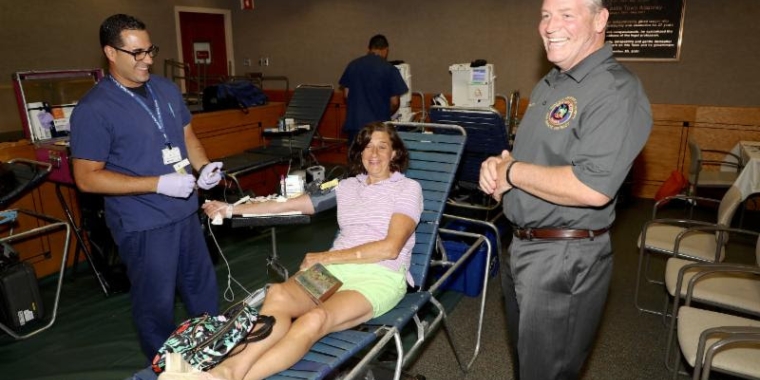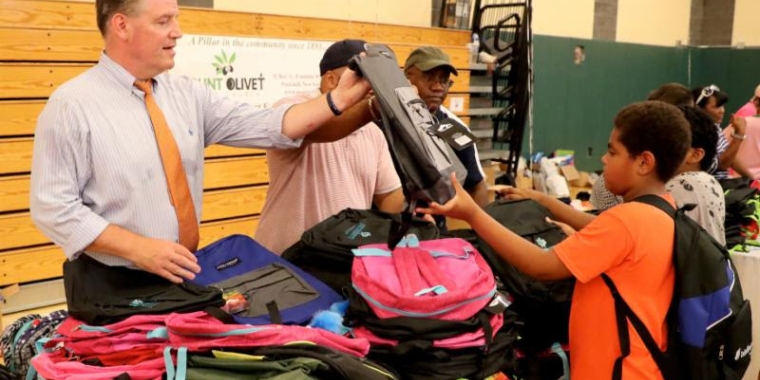
Senator Murphy On Proposed Hudson River Anchorage Rule: "It Doesn't Hold Water"
August 2, 2016
-
ISSUE:
- Coast Guard
- Hudson River U.S. Coast Guard Anchorage Proposal
- hudson river
- Environmental Conservation
- navigation law
VERPLANCK, NY - The Hudson River is one of the most cherished natural resources in the Hudson Valley. Boating enthusiasts maneuver through its placid waters and nurture lovers marvel at its picturesque views. It's all being threatened by a United States Coast Guard proposed federal rule to establish sixteen new anchorage locations along the Hudson River.
At a press conference held at the Hudson Valley Marine, Senator Terrence Murphy, an advocate for the preservation of the Hudson River's natural environment, voiced his opposition to the project. "There are four main issues with this proposal: One, the lack of transparency. Two, it's a navigational hazard. Three, it's an environmental hazard waiting to happen. Four, this is a homeland security nightmare," he said.
John Cronin, a senior fellow for environmental affairs at Pace University Environmental Law school, is the former Hudson Valley Riverkeeper and was business agent for the New York State Commercial Fisherman's Association. "Senator Murphy is an environmental hero in the New York State Senate and we are very appreciative of his efforts," he said.
"There is a consistent theme on the Hudson River that I teach my students, at every critical juncture in Hudson River environmental history, the federal government is our adversary," Cronin said. "Let me tell you something about the almost four-square miles of parking lot for oil tankers and barges that the Coast Guard wants to create. Three-quarters of them are on traditional commercial fishing grounds. The fishery may be "closed" right now, but what does that mean. It means the federal government has totally given up on the restoration of the Hudson River fishery, because [in their view] its better off being a parking lot than it is being a source of jobs, as it has been for hundreds of years for working commercial fishermen on the Hudson."
"As written, by rule, these vessels will be permitted to be unlit and unmanned," Senator Murphy said. "Do we really want unmanned oil tankers parked so close to Indian Point? In this day and age we can never be too safe. This proposed rule doesn't hold water."
"Once again, the federal government wants to do what it wants, where it wants, and that's just not okay," Westchester County Executive Rob Astorino said. "The presence of unattended commercial barges just yards off our shore presents environmental and security concerns. I urge the residents of Westchester to let their voices be heard."
"I am deeply concerned about the potential use of the proposed anchorage areas by vessels carrying crude oil or refined petroleum products," Dutchess County Executive Marcus Molinaro said. "This increases the chances for an oil spill or exposure to pollutants, which creates increased risks for the immediate and surrounding areas of the Hudson River. The environmental impact could be significant, and has the potential to extend far beyond the immediately-affected areas of Yonkers to Kingston."
With the tragedy of 9/11 still prominent in our memories, the stark reality is the addition of unmanned and unlit barges along the river could pose a significant homeland security risk.
In addition, the barges could pose a significant safety risk for recreational boaters. A relevant example would be the early morning March 2016 tragedy in which an 84-foot tugboat collided with a barge near the Tappan Zee Bridge, killing three people. Adding barges to an already active waterway will only increase the probability of this happening again. In December, 2012 the 600-foot oil tanker Stena Primorsk, loaded with 11.7 millions of light crude oil, ran aground 10 miles south of the Port of Albany, putting a 13-foot hole in its hull. Fortunately, the vessel's inner hull was not damaged, but the accident clearly demonstrated the potential hazards associated with navigating the river while transporting crude oil.
Another major concern has to be the ecological health of the Hudson River. Towns such as Sleepy Hollow, Montrose, Verplanck and Peekskill would be at the epicenter of any disaster along the river. New York State has also invested significant money and resources to restore the Hudson River Estuary.
If the Coast Guard's proposal is approved, more than 2,000 acres of the estuary will be taken over and used as anchorage grounds. Many of the riverside towns have invested millions of dollars to revitalize their waterfront areas. The sight of a tanker of barge anchored off shore could curtail business.
"The barges are eyesores that could be detrimental to the visual aesthetics of the Hudson River," said Linda Puglisi, Cortlandt Town Supervisor. "We are already burdened with a nuclear power plant and the continuing construction of the Spectra gas line. We do not need to further devalue our shoreline by allowing barges and tankers to anchor offshore."
Also present during the press conference was Putnam County Legislator Barbara Scuccimarra, Westchester County Legislator John Testa, Cortlandt Deputy Supervisor Frank Farrell, Peekskill City Councilman Joe Torres and members of the Peekskill Yacht Club, Croton Mayor Dr. Greg Schmidt and Deputy Mayor Bob Anderson, Buchanan Mayor Theresa Knickbocker and Steve Winkleman, owner of Husdon Valley Marine.
Residents may express their opposition and register public comment by signing Senator Murphy's petition, located here.
Share this Article or Press Release
Newsroom
Go to Newsroom

